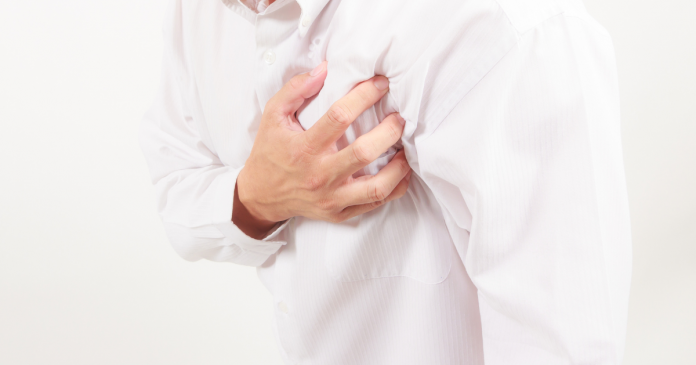Symptoms of a heart attack can be described as an excruciating, chest-clenching feeling. Nevertheless, health authorities note that in a large number of cases, this tell-tale pain may not be what an individual is experiencing.
In fact, the Australia’s Heart Research Institute estimates that of the 57,000 heart attacks that occur in Australia each year, 15 per cent of these are ‘silent’ heart attacks. A silent heart attack is accompanied by relatively mild or no symptoms. The damage is done but an individual is not aware of it.
Therefore, it is crucial to identify silent heart attack symptoms as soon as possible. This is because the sooner you get treatment, the greater the chance of you surviving without permanently damaging your heart.
In an effort to help you recognize the subtle symptoms of a heart attack, Reader’s Digest spoke with cardiologists and other health experts.
1) Feeling like you’re being hugged tightly
Chest pain associated with heart attacks is often described as sharp, stabbing, or dull. However, a heart attack can sometimes feel like pressure and heaviness on your chest, or as if you are being tightened up, says Dr Jim Liu.
2) Fatigue
Dr Rosen observes that fatigue is one of the most common symptoms of a heart attack she sees, especially in female patients. “In my 25 years of practice, people on the verge of a heart attack report feeling tired and not able to do their usual activities,” says Dr Rosen.
During a heart attack, blood flow to the heart is reduced. This puts extra stress on the muscle, which is a reason this feeling of exhaustion can occur. If you’re feeling fatigued, it’s best to consult your doctor. They will decide if an electrocardiogram (EKG), which checks heart activity – or another heart test – is necessary.
3) Soreness in the back, arms, or chest
Back and chest pain, as well as pain in any arm – not just the left – are often signs of a silent heart attack. Dr Rosen explains that people tend to ignore the pain since it is not accompanied by the chest heaviness that is typically associated with a heart attack.
The pain may feel like a pulled or sore muscle or ache as if you slept on it wrong. It may also come and go or remain constant. To be safe, if the pain is something new and it isn’t going away, you should talk to your doctor about it, even if it’s a body part that isn’t usually associated with the heart, she says.
4) Pain during exercise
Dr. Liu says one commonly overlooked symptom of a heart attack is chest, arm, shoulder, or back pain that only occurs during exercise.
If you have a partial blockage in your coronary arteries, that can limit blood flow to your heart, causing a feeling of weakness and pain. The pain may stop when you stop exercising, as the heart doesn’t need as much blood flow, or it may continue even during rest. Both can be concerning signs of heart disease – but, Dr Liu suggests, the former may suggest a heart attack has already occurred; while the latter may mean one is imminent.
5) Seemingly unusual shortness of breath
A trip up stairs is usually no problem, but if suddenly you feel like you are gasping for air, this may mean you are having a heart attack.“Women especially tell me they noticed feeling fatigued or breathless while walking up steps or carrying groceries when they normally wouldn’t,” says Dr Rosen.
6) Throat, neck, or jaw discomfort
Unexpected discomfort in the neck or jaw, or tightness in the throat can indicate a heart attack, says Dr Kini. You should contact your doctor immediately if you experience any of those symptoms. It’s especially important for people with diabetes to pay attention to subtle changes like this.
7) Sweating for no reason
Hot flashes, cold sweats, and night sweats may be dismissed as a sign of hormone imbalance or aging, but excessive sweating can be an indication of a serious health concern.
A subtle symptom of a heart attack can be sweating even when you are not exercising or otherwise physically active. The sweating may come on suddenly and seemingly for no reason, or you may wake up drenched.
8) Vertigo or fainting
You may experience light-headedness, dizziness, or even faintness if the room feels like it is spinning. Vertigo may also trigger nausea and hot flashes.
Note: Women are often more likely to report this symptom than men – just one example of how heart attack symptoms can feel different for women.
9) Heartburn or belching
If you have an occasional heartburn flare-up after a heavy lunch, it may be nothing to worry about. However, if it’s out of the ordinary or you haven’t experienced heartburn before, Dr Liu suggests you see your doctor.
Angina, a heartburn-like chest pain, is caused by a lack of blood flow to the heart that can signal a heart attack.
10) Stomach upset
Dr Rosen says heart attack symptoms can sometimes mimic stomach problems such as nausea, vomiting, or overall gastrointestinal upset – especially in women. “If you don’t feel well, always call your doctor. It could be that taco you had at 10pm but it could also be a heart attack,” she says.


